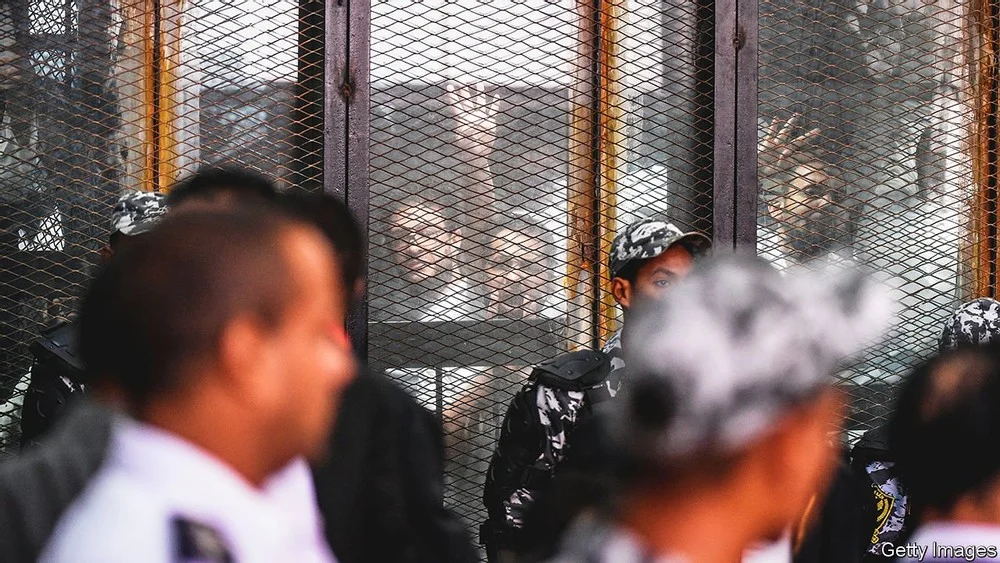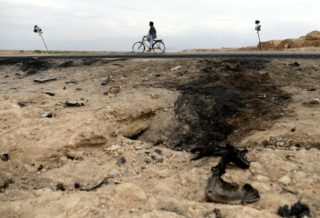AMMAN — WHEN HASSAN AL-BANNA founded the Muslim Brotherhood in Egypt nearly a century ago he implored his followers to seek “self-sacrifice, not personal advantage”. Today, though, they are struggling to comply. The oldest and once-powerful Islamist movement has been tearing itself apart. Leaders in Istanbul and London exchange insults, accuse each other of corruption or, worse, serving foreign spy agencies. “Instead of sacrificing themselves they are sacrificing the movement,” says Osama Gaweesh, a former Brother who lives in Britain.
There have been arguments within the Brotherhood over strategy and tactics ever since its creation. But the discord worsened after Abdel-Fattah al-Sisi, then a general, toppled Egypt’s first democratically elected government, led by the Brotherhood, in 2013. Mr Sisi, who is now president, imprisoned many of the group’s members. Others went into hiding or fled abroad. Disagreements sprang up over how to respond to the repression. An “old guard” prioritised the Brotherhood’s survival and advocated a pragmatic approach in dealing with the Egyptian state. Others favoured a more confrontational stance. Some members turned to violence.
Today the priority for the rank and file, according to several members, is getting the Egyptian detainees (some of whom are pictured) out of prison. But their efforts have been stymied because a new rift has emerged between members of the old guard over who should lead the Brotherhood. On one side is Ibrahim Mounir, who succeeded Mahmoud Ezzat as acting supreme guide (or leader) after the latter was captured in Egypt last year. On the other is Mahmoud Hussein, the former secretary-general, whom Mr Mounir suspended in October, along with five other prominent members, over alleged corruption. After rejecting that decision, Mr Hussein and the five members sent out a statement dismissing Mr Mounir from his post.
Mr Mounir, who lives in London, oversees the Brotherhood’s international network and has good relations with foreign governments. But Mr Hussein, who lives in Istanbul, controls the Brother hood’s website and its bank accounts, and has the keys to its Istanbul-based television network, Watan. Critics accuse him of ousting rivals and cutting payments to the families of detainees. “He treats the Brotherhood as his possession,” says Azzam Tamimi, an Islamist thinker in Jordan.
The unusually public dispute, involving smear campaigns on both sides, has thrown the Brotherhood into turmoil at a time when Sunni Islamists are struggling across the Arab world. Elections in Iraq and Morocco swept them out of government, while strongmen in Tunisia and Sudan pushed them from power. Qatar and Islamist-led Turkey have offered exiled Brothers refuge and supported the group as a way to project influence. But these countries now have other priorities. Both are seeking reconciliation with anti-Islamist neighbours, such as Egypt and the United Arab Emirates. Qatar has asked Brotherhood activists to leave. Turkey has put pressure on Islamist satellite- tv stations to dial down their invective. “The global movement is no more,” says Mr Tamimi.
The Brotherhood has bounced back from waves of repression in the past. But it is not clear how it will heal itself, as normally it falls to its leaders to settle internal disputes. Members are split over whom to follow. Moreover, many of them are disillusioned. Some say their leaders have not tried hard enough to reach an amnesty deal with Mr Sisi. Younger members complain about the lack of fresh faces at the top. Mr Mounir has at least appointed a young spokesman called Sohaib Abdel-Maqsoud. “We need our own Arab spring if we want a renaissance,” says Mr Maqsoud.
By The Economist





